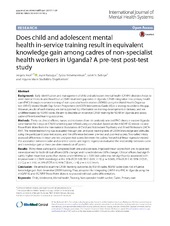| dc.contributor.author | Akol, Angela | en_US |
| dc.contributor.author | Nalugya, Joyce | en_US |
| dc.contributor.author | Nshemereirwe, Sylvia | en_US |
| dc.contributor.author | Babirye, Juliet N. | en_US |
| dc.contributor.author | Engebretsen, Ingunn Marie S. | en_US |
| dc.date.accessioned | 2017-11-10T11:20:59Z | |
| dc.date.available | 2017-11-10T11:20:59Z | |
| dc.date.issued | 2017-08-24 | |
| dc.Published | Akol A, Nalugya J, Nshemereirwe, Babirye JN, Engebretsen IMS. Does child and adolescent mental health in-service training result in equivalent knowledge gain among cadres of non-specialist health workers in Uganda? A pre-test post-test study. International Journal of Mental Health Systems. 2017;11:50 | eng |
| dc.identifier.issn | 1752-4458 | |
| dc.identifier.uri | https://hdl.handle.net/1956/16928 | |
| dc.description.abstract | Background: Early identification and management of child and adolescent mental health (CAMH) disorders helps to avert mental illness in adulthood but a CAMH treatment gap exists in Uganda. CAMH integration into primary health care (PHC) through in-service training of non-specialist health workers (NSHW) using the World Health Organisation (WHO) Mental Health Gap Action Programme (mhGAP) Intervention Guide (IG) is a strategy to address this gap. However, results of such training are not supported by information on training development or delivery; and are undifferentiated by NSHW cadre. We aim to describe an in-service CAMH training for NSHW in Uganda and assess cadre-differentiated learning outcomes. Methods: Thirty-six clinical officers, nurses and midwives from 18 randomly selected PHC clinics in eastern Uganda were trained for 5 days on CAMH screening and referral using a curriculum based on the mhGAP-IG version 1.0 and PowerPoint slides from the International Association of Child and Adolescent Psychiatry and Allied Professions (IACAPAP). The residential training was evaluated through pre- and post- training tests of CAMH knowledge and attitudes using the participants’ post-test scores; and the difference between pre-test and post-test scores. Two-tailed t-tests assessed differences in mean pre-test and post-test scores between the cadres; hierarchical linear regression tested the association between cadre and post test scores; and logistic regression evaluated the relationship between cadre and knowledge gain at three pre-determined cut off points. Results: Thirty-three participants completed both pre-and post-tests. Improved mean scores from pre- to post-test were observed for both clinical officers (20% change) and nurse/midwives (18% change). Clinical officers had significantly higher mean test scores than nurses and midwives (p < 0.05) but cadre was not significantly associated with improvement in CAMH knowledge at the 10% (AOR 0.08; 95 CI [0.01, 1.19]; p = 0.066), 15% (AOR 0.16; 95% CI [0.01, 2.21]; p = 0.170), or 25% (AOR 0.13; 95% CI [0.01, 1.74]; p = 0.122) levels. Conclusion: We aimed to examine CAMH learning outcomes by NSHW cadre. NSHW cadre does not influence knowledge gain from in-service CAMH training. Thus, an option for integrating CAMH into PHC in Uganda using the mhGAP-IG and IACAPAP PowerPoint slides is to proceed without cadre differentiation. | en_US |
| dc.language.iso | eng | eng |
| dc.publisher | BioMed Central | eng |
| dc.relation.ispartof | <a href=" http://hdl.handle.net/1956/18872" target="blank"> Access to Child and Adolescent Mental Health services in Uganda: Investigating the role of Primary Health Care and Traditional Healers</a> | |
| dc.rights | Attribution CC BY | eng |
| dc.rights.uri | http://creativecommons.org/licenses/by/4.0/ | eng |
| dc.subject | cadre | |
| dc.subject | primary care | |
| dc.subject | Children | eng |
| dc.subject | adolescent | eng |
| dc.subject | Mental health | eng |
| dc.subject | training | eng |
| dc.subject | non-specialist health worker | eng |
| dc.title | Does child and adolescent mental health in-service training result in equivalent knowledge gain among cadres of non-specialist health workers in Uganda? A pre-test post-test study | en_US |
| dc.type | Peer reviewed | |
| dc.type | Journal article | |
| dc.date.updated | 2017-10-05T08:01:01Z | |
| dc.description.version | publishedVersion | en_US |
| dc.rights.holder | Copyright 2017 The Author(s) | |
| dc.identifier.doi | https://doi.org/10.1186/s13033-017-0158-y | |
| dc.identifier.cristin | 1502419 | |
| dc.source.journal | International Journal of Mental Health Systems | |

